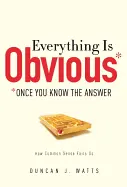
Everything Is Obvious - by Duncan Watts
ISBN: 0385531680Date read: 2022-10-05
How strongly I recommend it: 4/10
(See my list of 430+ books, for more.)
Go to the Amazon page for details and reviews.
Common sense and intuition are often wrong. They are like mythology, good for explaining events with stories, but not for understanding. Some good insights here.
my notes
Social order is maintained by hidden rules that we don’t even realize exist until we try to break them.
We are guided and shaped by unwritten rules - so many that we couldn’t write them all down if we tried.
Nevertheless, we expect reasonable people to know them all.
The Machiguenga live in a society in which the only relationship bonds that carry any expectation of loyalty are with immediate family members. When playing the ultimatum game with a stranger, therefore, Machiguenga participants saw little obligation to make fair offers, and experienced very little of the resentment that would well up in a Western player upon being presented with a split that was patently unequal. To them, even low offers were seen as a good deal.
Social knowledge can be learned only by participating in society itself.
Absence indeed makes the heart grow fonder, but out of sight is out of mind.
Look before you leap, but he who hesitates is lost.
These are not necessarily contradictory, because we invoke different aphorisms in different circumstances.
But because we never specify the conditions under which one aphorism applies versus another, we have no way of describing what it is that we really think or why we think it.
Common sense is not so much a worldview as a grab bag of logically inconsistent, often contradictory beliefs, each of which seems right at the time but carries no guarantee of being right any other time.
Common sense fails when used for purposes beyond the everyday.
We don't need the scientific method for the human/social world, where our unaided intuition is so much better than it is in physics.
Is more choice better or worse?
Do taxes stimulate the economy?
Social scientists are endlessly perplexed by these questions, yet many people feel as though they could come up with perfectly satisfactory explanations themselves.
Scientific studies, to figure out what we’re pretty sure we already know, seem largely unnecessary.
Common sense makes sense of the world, but not understanding it.
Common sense often works just like mythology: We think we have understood, but we have simply papered over with a plausible-sounding story.
Common sense actually inhibits our understanding of the world.
Every argument of social consequence is an argument about why people make the choices they make.
And, of course, how they can be encouraged, educated, legislated, or coerced into making different ones.
Economics is all about choice, while sociology is about why people have no choices.
After the subjects had finished their work we asked them some questions, including how much they thought they ought to have been paid for what they had just done.
Interestingly, their responses depended less on the difficulty of the task than on how much they had been paid to do it.
Subjects who were paid one cent per task thought they should have been paid five cents.
Subjects who were paid five cents thought they should have been paid eight cents.
Subjects who were paid ten cents thought they should have been paid thirteen cents.
No matter what they were actually paid - (remember some 10x as much as others) - everyone thought they had been underpaid.
The quality of their work did not change with pay level at all, even though they were paid only for the tasks they completed correctly.
Financial incentives are largely irrelevant to performance.
Policy makers can always persuade themselves that all they need to do is to design the correct incentive scheme.
But that was precisely what they thought they were previously doing.
He was accustomed to in physics. Sociology seemed like an endless conglomeration of special cases, when someone did something for some reason one time, and someone else did something else for some other reason at another time.
Thus if your house burns down in a freak fire, you’re devastated, but if your whole city is wiped out in an earthquake and hundreds of your neighbors die, you feel lucky to be alive.
Technologies allow us to observe, in high fidelity, the real-time behavior of large groups, and even societies as a whole.